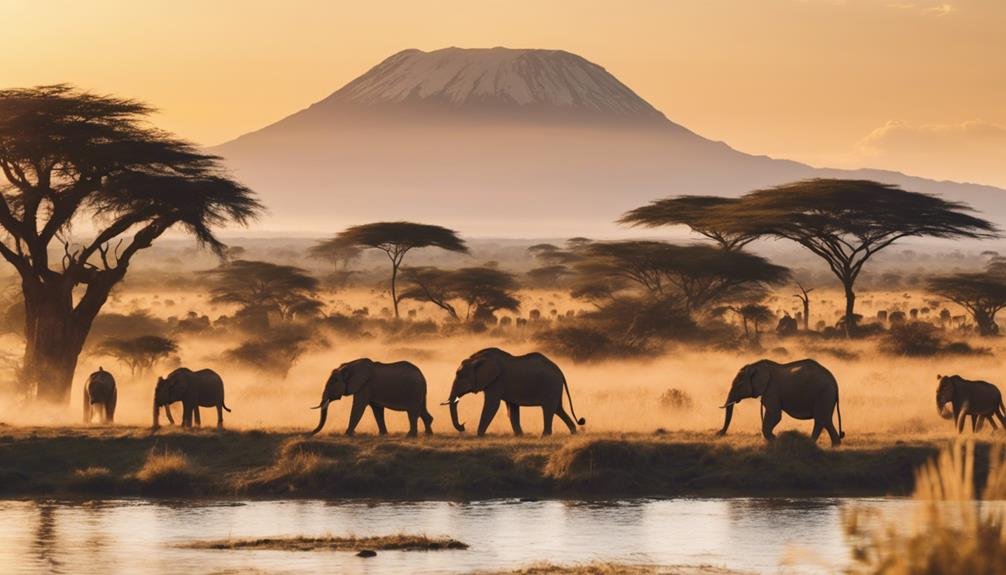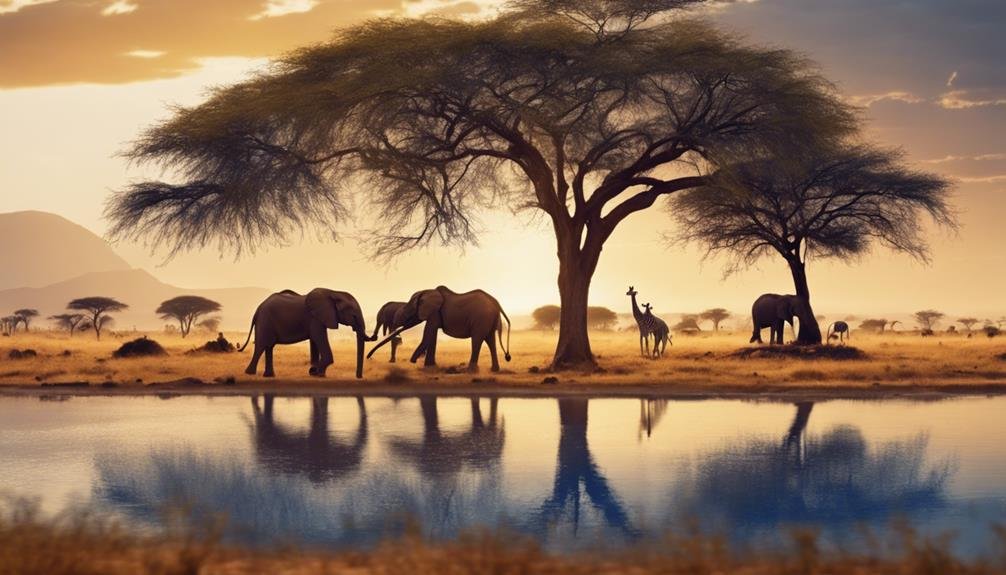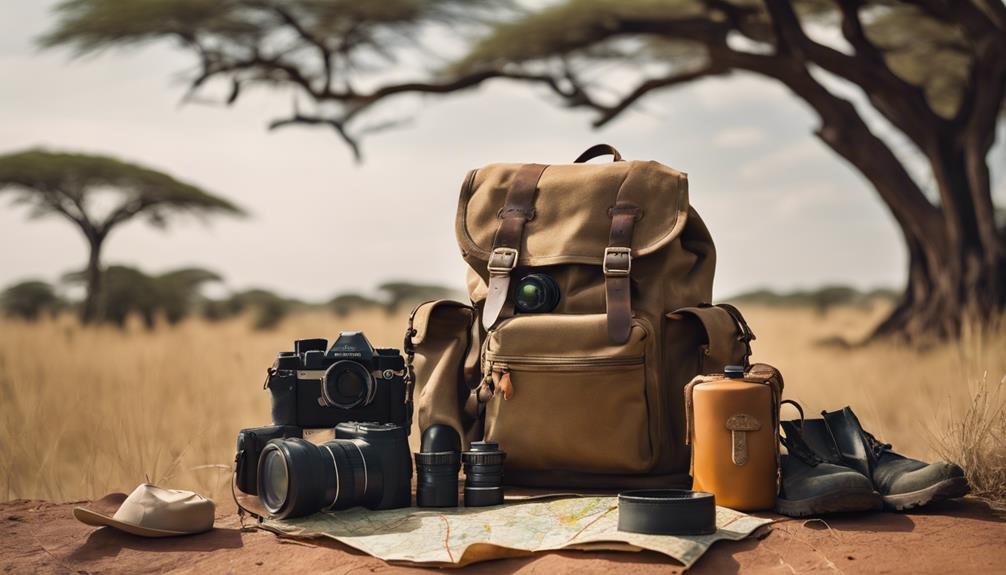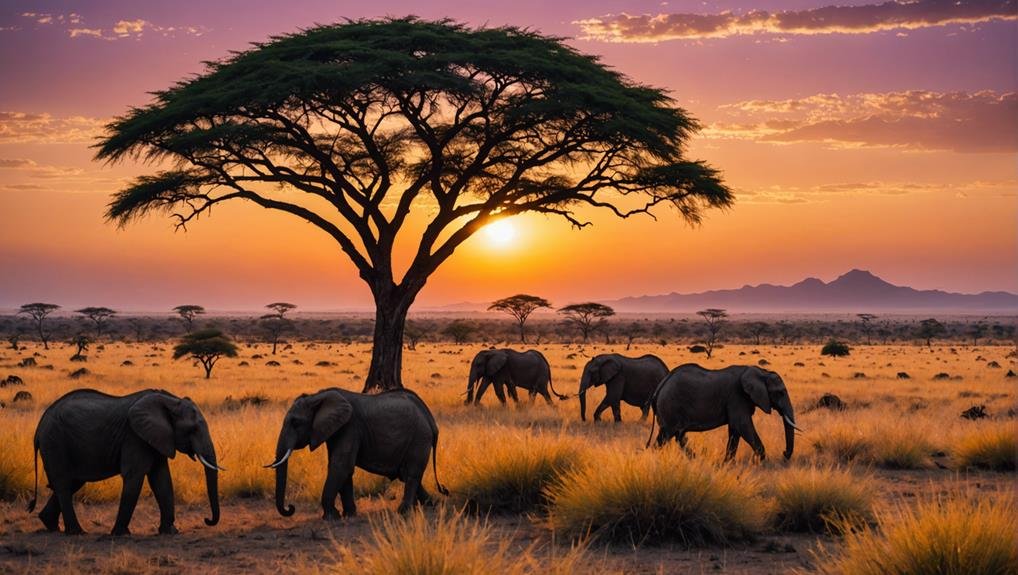When considering an African Safari, feel its unique blend of excitement and tranquility. Imagine spotting a lion stalking its prey in the Serengeti or watching a family of elephants roam freely in Kruger National Park.
Each destination, from the Masai Mara‘s golden plains to Rwanda’s dense forests, provides a distinct experience. But how do you choose the best time to visit, select the right accommodation, and guarantee your safety and health? There’s much more to explore, offering insights to prepare you for an unforgettable journey into Africa’s wild heart.
Key Takeaways
- Serengeti National Park and Masai Mara are top destinations for witnessing the Great Migration.
- Kruger National Park in South Africa is ideal for spotting the Big Five.
- The dry season from May to October is the best time for wildlife viewing in Southern Africa.
- Luxury lodges and tented camps offer immersive and comfortable safari experiences.
- Pack lightweight, breathable clothing, sunscreen, insect repellent, binoculars, and a camera.
Top Safari Destinations

When you’re planning an African safari, some of the top destinations worth exploring are Serengeti National Park, Kruger National Park, Masai Mara, Madagascar, and the Zambezi River. Each of these locations offers something unique that guarantees it’s a must-visit.
The Serengeti in Tanzania is renowned for the Great Migration, during which millions of wildebeests and zebras traverse the plains in a spectacular display of nature. It’s a sight you won’t want to miss.
In South Africa, Kruger National Park is one of the largest game reserves on the continent. It’s famous for its incredible diversity of wildlife, including the Big Five: lions, leopards, elephants, rhinos, and buffalo.
Masai Mara in Kenya offers a quintessential safari experience. Here, you’ll find abundant wildlife, from majestic lions to swift cheetahs and massive elephants, all set against stunning landscapes.
The Zambezi River, straddling Zambia and Zimbabwe, provides a different kind of adventure with river safaris. Drift along the river to spot hippos, crocodiles, and various bird species.
Each destination guarantees a memorable experience, allowing you to immerse yourself in Africa’s breathtaking beauty and diverse wildlife.
Wildlife Highlights
On an African safari, you’ll encounter some of the most iconic and diverse wildlife, making every moment unforgettable. Imagine witnessing the Great Migration in the Serengeti and Masai Mara, where over 2 million animals move in search of lush grazing lands.
This spectacle is a must-see for anyone seeking a profound wildlife experience. In Zambia, you can start on a walking safari, getting up close and personal with the Big Five and massive elephant herds.
Zimbabwe offers unparalleled opportunities to spot the Big Five and gaze at the breathtaking Victoria Falls, adding another layer to your safari adventure.
For those seeking luxury African safaris, the Masai Mara provides an authentic 1920s experience, complete with interactions with the Masai Mara Tribe. Staying at private lodges promises a more intimate and exclusive encounter with the wild.
Rwanda’s mighty apes offer another unique wildlife experience. Trekking through dense forests to observe these magnificent creatures is life-changing. Starting at $767, the private lodges provide a comfortable base for these adventures.
Whether it’s the vast plains of the Serengeti or the dense forests of Rwanda, Africa’s wildlife highlights promise unforgettable memories.
Best Times to Visit

Timing your visit to coincide with the best wildlife viewing periods is essential to make the most of your African safaSafarire are some key times to take into account for your adventure:
- Great Migration in East Africa: Visiting from July to September gives you a front-row seat to the Great Migration, where millions of wildebeest, zebras, and other animals move across the Serengeti and Maasai Mara. It’s a spectacle you won’t want to miss.
- Southern Africa’s Dry Season: From May to October, the dry season is ideal for safari-goers in Southern Africa. This period offers excellent wildlife viewing as animals congregate around water sources, making them easier to spot.
- Shoulder Seasons: For fewer crowds and pleasant weather, consider the shoulder seasons of April-May and September-October. These months provide good wildlife sightings without the peak-season hustle.
- Rainy Season: While the rainy season from November to March can bring challenges like muddy roads, it also offers lush landscapes and fantastic birdwatching opportunities. Baby animals are often born during this time, providing unique viewing experiences.
Consult with local experts or tour operators to tailor your trip based on your interests and desired safari experiences. Timing truly makes a difference in the African safari experience!
Safari Accommodation Options
Exploring the diverse safari accommodation options lets you tailor your experience to suit your comfort and adventure preferences. For a touch of luxury, consider staying in high-end lodges that boast private plunge pools, elegant decor, and personalized service.
These lodges often integrate eco-friendly practices, ensuring your stay minimizes its environmental impact without sacrificing comfort. If you’re seeking a more immersive experience, tented camps in the heart of the wilderness are an excellent choice.
These camps bring you closer to nature and wildlife, letting you hear the sounds of the African night right outside your tent. Many of these camps also prioritize sustainability, blending seamlessly with the natural surroundings.
Some lodges offer unique options for those looking for exclusive experiences, like sleep-outs under the stars or romantic bush dinners. These activities add a special touch, making your safaSafariorgettable.
Whether you prefer the opulence of a luxury lodge or a tented camp’s raw, adventurous spirit, there’s a perfect accommodation option for every traveler. Matching your lodging to your personal preferences will enhance your African safari adventure.
Essential Packing Tips

After selecting your ideal safari accommodation, it’s time to prepare for the journey with some smart packing strategies. Packing right can make your Africa SafaSafari an unforgettable experience, especially when you’ve got the essential items for game viewing and exploring the bush.
Here are some essential packing tips to make sure you’re ready for your safari adventure:
- Clothing: Pack lightweight, breathable clothing for hot days and a few layers for cooler nights. Neutral colors blend best into the natural environment.
- Protection: Remember sunscreen, insect repellent, and a hat to safeguard yourself from the sun and pesky bugs. Comfortable walking shoes are also a must for game drives and walking safaris.
- Equipment: Binoculars and a camera with extra batteries are important for capturing those incredible wildlife moments. You don’t want to miss a thing!
- Hydration: A reusable water bottle is essential to stay hydrated during game drives and other activities. Keep it filled and within arm’s reach.
Check with your safari operator for specific packing recommendations based on your destination and planned activities. With these packing tips, you’ll be well-prepared for an amazing safari experience in Africa.
Safety and Health Tips
Ensuring your safety and health on an African safari requires careful planning and adherence to guidelines. Before starting on your Wildlife Safari, check the vaccination requirements for the specific African countries you plan to visit.
Vaccinations are essential for protecting your health and guaranteeing a safe African experience. Carry insect repellent and wear long sleeves and pants to guard against mosquito-borne diseases like malaria.
This simple step can greatly reduce health risks during your safaSafariaying. Drinking hydrated is crucial, so drink only bottled water and avoid tap water. Guaranteeing your food is thoroughly cooked helps prevent food-borne illnesses, keeping your African adventure enjoyable.
Pack a first aid kit with necessary medications and consult a healthcare professional for travel health advice before departure. Having the right medical supplies can make a big difference if minor health issues arise.
Regarding wildlife encounters, always follow the safety guidelines provided by your guides. Their expertise ensures you minimize risks and have a safe, memorable safari experience. Taking these precautions will prepare you to enjoy Africa’s incredible wildlife and landscapes.
Conclusion
Starting an African safari is an adventure you’ll never forget. You’ll witness breathtaking landscapes, encounter incredible wildlife, and create memories that’ll last a lifetime.
Whether exploring savannahs, tracking the Big Five, or trekking through forests, each moment is a step deeper into the wild. With the right preparation and a spirit of adventure, your Safari will be a truly transformative experience. So, pack your bags and prepare for a lifetime’s journey!

